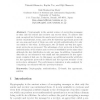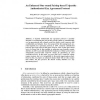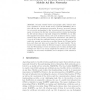121 search results - page 4 / 25 » Identity-based key agreement protocols from pairings |
ISCI
2010
13 years 4 months ago
2010
Key agreement (KA) allows two or more users to negotiate a secret session key among them over an open network. Authenticated key agreement (AKA) is a KA protocol enhanced to preve...
MDAI
2005
Springer
14 years 25 days ago
2005
Springer
Cryptography is the ancient science of encrypting messages so that only the sender and receiver can recover them. To achieve this goal, an agreed key between the sender and receive...
ICCSA
2007
Springer
14 years 1 months ago
2007
Springer
A tripartite authenticated key agreement protocol is generally designed to accommodate the need of three specific entities in communicating over an open network with a shared secre...
INDOCRYPT
2009
Springer
14 years 1 months ago
2009
Springer
Abstract. Contrary to conventional cryptographic wisdom, the NIST SP 800-56A standard explicitly allows the use of a static key pair in more than one of the key establishment proto...
ADHOCNOW
2006
Springer
14 years 1 months ago
2006
Springer
Recently, identity-based cryptographic (IBC) schemes have been considered to secure mobile ad hoc networks (MANETs) due to their efficient key management properties. However, propo...



